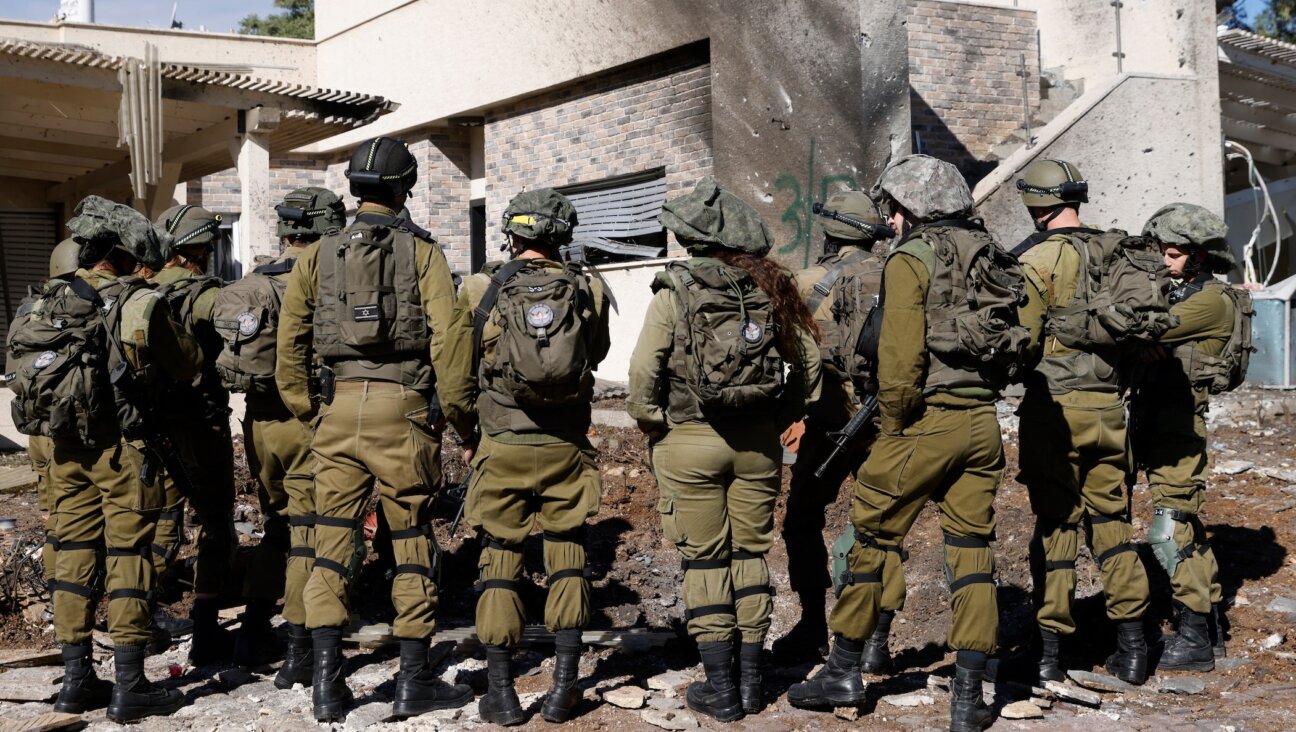Congregational Schools Focus on Teacher Training
Leaders in Jewish education agree that it’s time to focus more on the quality of congregational Hebrew schools — and a critical piece of that is teaching the teachers how to teach. Professional development, they say, must go beyond one-shot workshops and become an ongoing, on-site, in-depth exploration of technique, skill and Jewish content. Some congregational schools are starting to take this suggestion to heart.
Notable national, regional and local programs that have emerged in the past decade or so to improve Jewish education include the Mandel Foundation’s Teacher Educator Institute, Philadelphia’s Nurturing Excellence in Synagogue Schools, the Jewish Education Service of North America’s Center for Excellence in Congregational Education and the Experiment in Congregational Education. Federations, bureaus and the denominational movements are offering more resources for Hebrew-school teachers than ever before.
No one knows how many children stand to gain if these efforts actually take off. But Eli Schaap, the assistant executive director of the Coalition for the Advancement of Jewish Education, hazards a guess that half of all Jewish American children who attend Jewish schools are enrolled in congregational schools.
One person working hard to develop her teachers’ skills is Pat Lukens, the director of education at Congregation Kerem Shalom, a small, unaffiliated synagogue in Concord, Mass. Children attend Hebrew school there once a week. The teachers earn $40 to $60 an hour for teaching time. They’re not compensated for planning time — standard practice in congregational schools — but they do receive nominal stipends for professional development. That is unusual.
Also unusual is Lukens’s approach. An example: One of her mantras is “know your students.” She explained: “It makes such a difference if, when [students] walk in, you can say, ‘So how was that math test you were worried about last week?’ It’s a whole different kid standing in front of you.” One of her teachers is a master at this, keeping meticulous, up-to-date information cards on each student. Lukens likes this teacher’s approach so much that she talks about her method during faculty meetings and requires other staff members to sit in and observe her. “I sent a teacher in there who said afterward, ‘I thought I knew my students. I don’t know my students,’” Lukens recalled. That teacher has since started keeping her own index cards.
This seemingly minor example represents a major change in how some congregational schools have started adopting the best educational ideas used in other schools: that a classroom conducive to learning grows from warm connections, not control tactics; that meetings should be forums to discuss craft, not administrative trivia, and that peer observation can be the most effective way to illustrate a point of pedagogy.
Lukens’s anecdote is also a story of proximity. Her teachers learned the technique of constructive peer observation at the nearby Boston-area offshoot of the Mandel Foundation’s Teacher Educator Institute. Synagogues located in areas rich with Jewish resources appear more likely to pick up the thread of teacher development. That may explain why Rabbi Robert Abramson, the United Synagogue of Conservative Judaism’s education director, sees these nascent efforts growing in certain spots around the country, particularly Boston, Philadelphia and Los Angeles. “The efforts have been ramping up over the past 10 years. It’s not quite a movement yet,” he said. Pushing this agenda forward, he says, are goal-oriented people with degrees in Jewish education, denominational movements and local bureaus of education.
Sharon Morton, the education director at Congregation Am Shalom — a Reform synagogue in Glencoe, Ill., a Chicago suburb — says that parents are also behind the shifts in congregational schools. “Part of the push for professional development came from parents and members of the education committee,” she said. “They were interested in how to individualize learning, how to integrate home and school.” Her staff meets weekly throughout the school year to study Jewish texts, discuss techniques and tweak lesson plans. Her teachers are under contract to attend professional-growth courses outside the school, and many are graduates of the Florence Melton Adult Mini-School, an intense, two-year, non-degreed Judaic-studies program.
Morton’s counterpart in San Diego, Harriet Wolpoff of Congregation Beth Am, a Conservative synagogue, says that the San Diego Agency for Jewish Education recognizes teachers who clock at least 50 hours of professional-development time annually. “I make sure I get the award each year” to set an example, said Wolpoff, who, as a full-timer, must put in 80 hours to be recognized. Between six and 10 of her 17 teachers also receive the award annually. Teacher Elisheva Edelson senses Wolpoff’s respect for her work: “Sometimes I suggest things. Harriet knows how to continue in the line of the school and receive the suggestions that I can bring from other parts,” Edelson said.
Why isn’t the approach of school leaders like Lukens, Morton and Wolpoff more widespread? Probably because, while congregational teachers often need more professional development than other teachers, they tend to have fewer incentives or opportunities to get it. Challenges abound. Hebrew-school teachers typically work between four and nine hours a week, earning maybe $5,000 a year. They are difficult to recruit and retain. Their backgrounds are all over the map, ranging from moonlighting public- or day-school teachers to college students to well-meaning members of the community. They frequently lack strong Judaic knowledge or teaching skills. They rarely have time to reflect on how to explain sophisticated Jewish concepts meaningfully to children. “There’s no national board of licensure for congregational-school teachers the way there is for day-school teachers,” said Wendy Rapport, the associate director for the Union of Reform Judaism’s Department of Lifelong Jewish Learning. And there’s often not much help on-site; they frequently work under school principals who view their own roles as administrators, not teachers of teachers.
Then, there’s getting the best professional-development bang for the cash-strapped synagogue buck. “The factor that makes or breaks a teacher-education program is not cost but quality,” said Judy Kupchan, the Florence Melton Adult Mini-School’s educational services director. “Is it challenging, serious, good adult learning? We have to provide the best faculty and a meaningful learning experience if we want to have an impact on how and what teachers teach,” she said.
Costs can range from a few hundred dollars to nearly five figures. Stipends to encourage teachers to attend an in-house weekly Bible study with the rabbi or school principal can cost very little. Locally offered courses and workshops cost more; a year’s tuition at the Florence Melton Mini-School is $400 to $600. And conferences and Israel trips can be very expensive: A Reform congregation in the Chicago area, for example, can spend $2,000 to $3,000 in conference fees for its principal, $1,000 to $2,000 for teachers or the principal to attend the annual CAJE conference, and $1,000 to $2,000 for consultants and special programs for teacher training throughout the school year, according to Morton. Study in Israel can cost $3,500 per person. And that’s just what congregations contribute; many professional development programs are heavily subsidized by local federations, foundations and the Conservative and Reform movements. What a synagogue spends, however, ultimately depends on its own creativity in putting together a sound professional-development package, according to Kupchan.
Improving Hebrew schools requires sustained attention — but synagogue agendas tend to cycle, observes Marion Gribetz, the director of the Center for Institutional and Professional Development at the Bureau of Jewish Education of Greater Boston. “People that get involved in congregations to make change have different agendas,” she said. The school isn’t always at the top of the list.
Ultimately, professional development is just one piece of the puzzle. “You need an entire model, a vision for your school,” said CAJE’s Eli Schaap. “You have to envision a school and have hiring, curriculum, working conditions, salaries, lesson plans and programs conform to that. If you don’t,” he said, “your school will be dysfunctional.”
A message from our Publisher & CEO Rachel Fishman Feddersen

I hope you appreciated this article. Before you go, I’d like to ask you to please support the Forward’s award-winning, nonprofit journalism so that we can be prepared for whatever news 2025 brings.
At a time when other newsrooms are closing or cutting back, the Forward has removed its paywall and invested additional resources to report on the ground from Israel and around the U.S. on the impact of the war, rising antisemitism and polarized discourse.
Readers like you make it all possible. Support our work by becoming a Forward Member and connect with our journalism and your community.
— Rachel Fishman Feddersen, Publisher and CEO






















